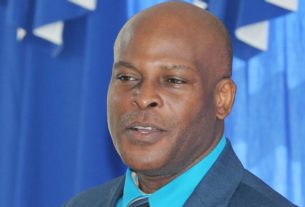PICTURED ABOVE — Minister in the Ministry of Foreign Trade, Sandra Husbands. (FP)
The Political Declaration of the 15th Session of the United Nations Conference on Trade and Development (UNCTAD 15), “Spirit of Speightstown”, was adopted by member states during the closing plenary and ceremony, this morning.
Minister in the Ministry of Foreign Trade, Sandra Husbands, who spoke on behalf of the Presidency of the Conference in Geneva, shared the importance of the Political Declaration.
“The Spirit of Speightstown seeks to capture the main challenges impacting our family of nations and their development aspirations, but particularly those amongst us that are most vulnerable. Building on the theme “From Inequality And Vulnerability: To Prosperity For All”, the Spirit of Speightstown declares, our vision for achieving the transformations necessary to build resilience, and to achieve our coveted sustainable development agenda….
“Indeed, the Political Declaration acknowledges that the combined effects of the pandemic, and the climate crisis presents a crisis of the global common good. In that regard, the “Spirit of Speightstown” calls for a revitalised covenant for development. It calls for understanding, compromise and cooperation at all levels,” Minister Husbands said.
In addition, she said the “Spirit of Speightstown” acknowledges the role that UNCTAD must play in realising prosperity for all. This, Minister Husband stated, must be anchored in the transformation set out in the Bridgetown Covenant.
“In our view, UNCTAD has a major role to play in fostering the required inter-governmental action necessary to generate the momentum towards a more resilient, sustainable, and prosperous world,” she declared.
Ms. Husbands said the Political Declaration also challenges persons to work across faith, cultures and nationalities to arrive at a shared vision for an interconnected world, which would ensure that everyone is able to achieve a better future, but in order for this to occur, global leaders must address the growing inequality and vulnerability that exist.
To do so, she called for a revitalised multilateral spirit, a conscious approach to financing sustainable development, addressing the digital divide and issues of tax matters to help reduce inequality and vulnerability.
“Cooperation and not unilateralism is needed now more than ever to address the challenges that confront us. We need to ensure that our multilateral institutions are fit for purpose, and that we have policies and instruments that give due attention to those that are most vulnerable – our women, children, the disabled, indigenous people, migrants, refugees, internally displaced persons, the homeless, and other marginalised groups,” she stressed.
BY SHEENA FORDE-CRAIGG — BGIS



